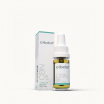Will CBN get you stoned?
Published:
Cannabinol, commonly known as CBN, is a unique cannabinoid found in cannabis plants that has recently gained attention for its wide range of potential effects and benefits. But one common question from those new to CBN is - will it get you stoned?
Contents:
Let's take an in-depth look at what science and research says about CBN and its psychoactive properties.

What is Cannabinol (CBN)?
Cannabinol (CBN) is one of over 100 identified cannabinoids found in the cannabis plant. Cannabinoids are the natural chemical compounds that give cannabis its therapeutic and medicinal properties.
The most well-known cannabinoids are tetrahydrocannabinol (THC) and cannabidiol (CBD). THC is the main psychoactive compound responsible for the "high" feeling from cannabis, while CBD is non-intoxicating and more studied for its potential health benefits.
Unlike THC, CBN is not directly produced by the cannabis plant. Instead, it is formed through the degradation and oxidation of THC. Over time, THC naturally converts to CBN in a process called auto-oxidation.
So in fresh cannabis with high THC, there will be very little CBN present. But in older, degraded cannabis, the THC breaks down into CBN, increasing its concentration.
This means that CBN levels are highest in older cannabis, ranging from 1% in fresh material to around 12% in degraded samples.
Does CBN Cause a High or Make You Feel Stoned?
Now to the main question - can CBN get you high or stoned?
The short answer is no, CBN is generally considered to be non-intoxicating and does not produce the high feeling of THC.
Multiple studies have confirmed that CBN has minimal binding affinity for the CB1 receptor in the brain. The CB1 receptor is responsible for mediating the psychoactive effects of THC.
CBN has a binding affinity of just 10% compared to THC. Rather than directly activating CB1 receptors, CBN acts as a negative allosteric modulator, altering the shape of the CB1 receptor to inhibit THC's activity.
So even in older, degraded cannabis with higher CBN levels, the presence of CBN can actually reduce the intoxicating effects of THC.
This means that consuming isolated or concentrated forms of CBN by itself will not cause any high or impairment.
However, some important caveats and considerations:
- CBN is often present alongside THC in cannabis products. So any psychoactive effect likely comes from the THC, not CBN.
- In very high doses, CBN may potentially enhance THC's effects. But it takes a much higher CBN dose than found in most products.
- Everyone's biochemistry is unique. While CBN is considered non-intoxicating, subjective experiences can vary. Start low and go slow when trying new cannabinoids.
So in summary, science clearly shows that pure CBN in normal doses does not directly lead to feeling high or stoned. Any intoxicating effect only comes from the presence of THC, not CBN itself.
Sources and Dosage of CBN
Since CBN occurs naturally from the degradation of THC, there are two main options for sourcing CBN:
- Hemp-derived CBN - Isolating CBN from hemp plants that contain higher THC due to degradation. Hemp-derived CBN products legally cannot contain more than 0.3% THC.
- Cannabis-derived CBN - Extracting CBN from cannabis plants that have undergone oxidation into CBN. Cannabis-derived CBN has no restrictions on THC content.
For therapeutic use, most people are recommended to start with 1-5mg doses of hemp-derived CBN and increase slowly from there. CBN is considered relatively safe and non-toxic, but long-term studies are still limited.
It's best to start low, monitor effects, and increase your dosage carefully if needed. Consulting a doctor knowledgeable in cannabinoids is also recommended.
Frequently Asked Questions About CBN
Is CBN psychoactive?
No, CBN is not directly psychoactive and does not produce a euphoric high feeling like THC. Any minimal psychoactivity only occurs in extremely high doses.
What's the difference between CBN and CBD?
CBN and CBD share some similar therapeutic qualities, but CBD comes directly from cannabis plants. CBN is formed from the degradation of THC as cannabis ages. CBD is also more widely studied for uses like anxiety and seizures.
Can you take CBN during the day?
Yes, CBN can be used in small doses during the daytime. But higher doses may cause drowsiness due to the sedative effects. Start low (1-5mg) and see how you respond.
Does CBN make you fail a drug test?
No, CBN itself does not lead to failed drug tests. But some hemp-derived CBN oils can still contain trace amounts of THC that could potentially lead to a failed marijuana drug test in rare cases. Look for broad or full-spectrum products tested for THC if drug testing is a concern.
Can you take CBN with medications?
It's best to consult your doctor before using CBN if you take any medications, especially for sleep or depression. CBN may increase sedation. But unlike THC, CBN does not affect drug metabolism pathways in the liver.
Conclusion: CBN Provides Therapeutic Benefits Without Intoxication
In conclusion, current research strongly indicates that CBN does not cause any intoxicating or psychoactive effects like THC. Consuming isolated CBN by itself in normal doses will not get you high or stoned.
While larger doses may cause some mild sedation, CBN shows promising therapeutic potential for uses like improving sleep, reducing inflammation, protecting neurons, and fighting bacteria.
As researchers continue studying this intriguing cannabinoid, CBN appears valuable as a non-intoxicating option for leveraging the medicinal benefits of cannabis.
So for those wanting the natural benefits of cannabis without any high feeling, CBN offers a compelling alternative to explore. Though more research is still needed, initial findings show CBN's potential for wellness without psychoactivity.









